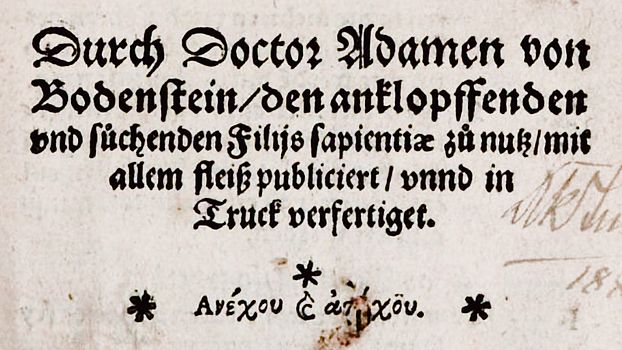/ News
Adam von Bodenstein reinstated to the register of the Faculty of Medicine

On January 27, 1564, the publisher of Paracelsian writings Adam von Bodenstein was expelled from the faculty due to his medical views. To draw attention to this injustice, the Faculty of Medicine symbolically reinstates von Bodenstein to the register of students exactly 460 years later.
The story, which comes to a close here, begins with Theophrastus von Hohenheim, known as Paracelsus, who came to Basel as a professor in 1527 and had to flee just one year later, partly because of his medical theories, which were considered heretical at the time. Adam von Bodenstein had published Paracelsus' theories in Basel and was therefore also expelled from the faculty. The expulsion decree states that he had, without the knowledge of the faculty, "published a number of books contrary to the right [and] true medicine in print uncesored and thereby made himself liable to the Teophrastic false doctrine."(1)
This "right and true medicine" essentially consisted of the scholarly reflections of late antique and high medieval authors - the treatment of patients was left to the wound specialists. Although the Paracelsian doctrine was also a child of its time, it propagated its own direct view and thus opened the door to scientific pharmacy and medicine as we know it today. Von Bodenstein's publishing activity was of great importance for this impulse.
Paracelsus was solemnly rehabilitated by the government of the Canton of Basel City in 1993. An arrest warrant against him from 1528 was symbolically lifted. However, nothing comparable was done for Adam von Bodenstein. This grievance is now to be rectified by reinstating him in the register.
The reinstatement takes place despite the fact that Adam von Bodenstein did not really deserve to be rehabilitated outside of the medical field. On behalf of Calvin, he denounced his fellow professor Sebastian Castellio as a heretic and polygamist because he had dared to speak out against the execution of heretics. His writings made Castellio one of the spiritual fathers of the European idea of tolerance; he died before he could be put on trial (2).
This part of Adam von Bodenstein was carefully considered in the Faculty of Medicine's decision. The faculty felt compelled to adopt an attitude that both the faculty lacked when they expelled him and that von Bodenstein lacked when he attacked Castellio: an attitude that does not reject a person lightly. The model for this is Sebastian Castellio himself, the great advocate of the still visionary idea of recognizing a person in all their breadth and width and therefore not condemning them completely because of a single attitude or deed: "For this is certain, the better one knows the truth, the less inclined he is to condemn others. For he who lightly condemns others reveals precisely by this that he knows nothing, since he does not know how to bear the other."
(1) Quoted from Albrecht Burckhardt, Geschichte der Medizinischen Fakultät zu Basel 1460-1900, Basel 1917, p. 57
(2) On Sebastian Castellio: Uwe Plath, Castellios Selbstverständnis in seiner Auseinandersetzung mit Calvin, Basel 2021
(3) Sebastian Castellio, Brief an Herzog Christoph, in: Das Manifest der Toleranz. Sebastian Castellio. On heretics and whether they should be persecuted, transl. by Werner Stingl, ed. by Wolfgang F. Stammer, Essen 2013, p. 69
